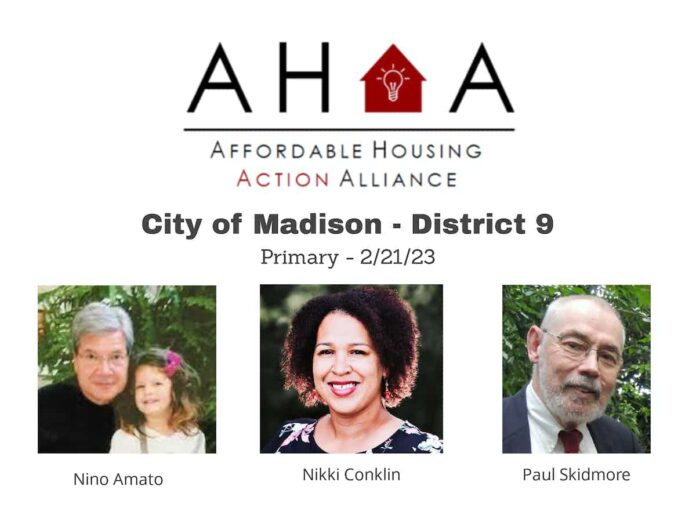While all the candidates say that affordable housing is a priority, read here to find out what they say they will do about it!
District 9 has a primary on Tuesday, February 21, 2022. Here’s a map of district 9, here’s where you find out where to vote. And here’s the candidates on affordable housing! All candidate answers can be found here.
- The City of Madison continues to put money into affordable housing, but we can’t develop affordable housing fast enough or in a large enough quantity for people with incomes that are at or below 30% of the Area Median Income (AMI). What new ideas would you bring to the table to assist us in getting more affordable housing for people at or below 30% AMI?
 Nino Amato
Nino Amato
The Mayor & City Council needs to “walk-their-talk” on expanding affordable and inclusionary housing in Madison. Following the April 6th Election, the City Council needs to establish an Affordable Housing Crisis Task Force which would include UW housing experts, retired section 8 developers, Madison’s Legislators, the Mayor’s Designee and 4 City Council members – and make specific recommendations on maximizing state & federal affordable housing programs by (1) utilizing city own vacant buildings, surplus land and city vehicle right-aways land; and (2) develop a cost-effective affordable housing model for a collaborative public-private partnership, for inclusionary and inter-generational housing co-ops; for long-term low- and moderate-income families and single people.
Nikki Conklin 
I support mixed socioeconomic developments. Everyone has a right to affordable housing. That is a basic need that should be met for all. We need to make sure that we are sending funds to areas of the City that typically don’t get invested in. And when opportunities arise, preference should be given to proposals that add affordable housing for folks at or below 30% AMI.
 Paul Skidmore
Paul Skidmore
Did not respond
- Much of the affordable housing that is currently being built in our area is Section 42 tax credit housing in which the Area Median Income (AMI) is used to determine rent amounts. And because the AMI is so high in Dane County the rent for many of the units ends up being close to market rate. What can we do to make sure that the affordable housing we build ends up being affordable enough to reach lower incomes? Should Section 42 developments that receive city funding be required to have more units affordable for those at or below 30% of AMI than they do now?
 Nino Amato
Nino Amato
It’s time for the Mayor & City Council Members to a lead role, statewide, in changing the “Housing Crisis Narrative.” Since there are no easy solutions to Section 42 Development Challenges based on current state and federal laws – the City of Madison must get out in front of this housing crisis by building a “Bi-partisan WI. Collaborative Affordable Housing Partnership with like-minded municipal members with the Wisconsin League of Municipalities, to lobby our Congressional Delegation, to draft a new source of funding for “Re-building America’s Affordable Housing Infrastructure, through municipal and county ‘bonding authority and innovative green-housing infrastructure design, for long-term housing sustainability.
Nikki Conklin 
Yes I do think that should be a requirement. There are too many folks at risk of homelessness due to high rents. As a City we should give progressive incentives for developers who maintain a significant proportion of their developments to provide affordable housing for these folks who are at or below 30% of AMI.
 Paul Skidmore
Paul Skidmore
Did not respond
- We need more nonprofit developers who are willing to build affordable housing and keep it affordable for longer periods of time. What can we do to get more nonprofit developers in our community and support their growth and success?
 Nino Amato
Nino Amato
Please reference my answer to Question #1, which would be part of this Task Force mission, to come up with a public-private non-profit affordable housing business model, that would attract investors and socially conscious developers.
Nikki Conklin 
I believe the City is taking some actions on this now. There are loan forgiveness programs for developers who choose to build affordable housing. Incentives are a great way to bring in support for others. I support policies that provide nonprofits with the right to first offer and refusal when new developments become available.
 Paul Skidmore
Paul Skidmore
Did not respond
- Most affordable housing is only affordable for a period of 40 years or less, meaning our investment in affordable units is lost after a set time. Please discuss any ideas that you have for keeping affordable housing in Madison affordable long-term?
 Nino Amato
Nino Amato
The period of 40 years legislation, never made sense, as it relates to affordable housing for essential workers and low income residents and need to be amended, with no time restrictions.
I will work on removing barriers both invisible and visible such as systems designed to segregate communities. I support establishing a land banking policy to combat gentrification and create permanently affordable housing in partnership with community land trusts in high density areas. When opportunities come up to make land use decisions I will work to prevent exclusionary zoning practices. I will also work to fund additional educational opportunities to help close the opportunity gap for BIPOC folks. I want to see everyone have access to fulfilling their basic needs. I will work hard to ensure that BIPOC folks have housing, employment, healthcare and education. I want to dismantle the criminal injustice system and try to fix the detrimental social, political and economic systems that hold back so many BIPOC folks. Another way to keep housing affordable long-term is to support funds for helping more folks into home ownership.
 Paul Skidmore
Paul Skidmore
Did not respond
- Tenants in the city and county have had access over the last couple of years to eviction prevention and security deposit funds thanks to the federal government’s COVID relief funding. These funds – the CORE program – likely will end in 2023. Do you think the city should prioritize providing more funds once the COVID money ends and if so, please give some ideas of sources of funding?
 Nino Amato
Nino Amato
Yes but given the levy limits on local units of government, 2.0 CORE program needs to be developed and the only way that will happen, is if Democrats take back the House, Keep the Senate and maintain the White House in the 2024 Presidential and Congressional Elections.
Nikki Conklin 
According to the City’s 2022 Housing Snapshot, more than half of the City of Madison’s population is renters, and almost half of the renters are rent-burdened (paying more than 30% of their income on housing). I would support more funds to help fill this gap. As for sources of funding, I support progressive local taxation so those who make more, will pay more.
 Paul Skidmore
Paul Skidmore
Did not respond
- Are there any changes that the city could make – zoning requirements, paperwork, etc. – that could make affordable housing development and operation easier and more attractive to nonprofits and businesses, and also less burdensome for tenants who have to complete a lot of paperwork and meet reporting requirements?
 Nino Amato
Nino Amato
Please reference my answer in Questions #1 which would be part of this Task Force mission to look at the current zoning requirements, approval process timetable and government papers work – and make recommendations to improve more swiftly the approval process since time is money, both in delays and construction materials – and look at creating a “City Ombudsman Program, who would not only trouble shoot barriers to a proposed project, but would also make recommendations to the Mayor and City Council members for “continuous process improvement of the planning and approval process.
Nikki Conklin 
As Alder, I serve on the Landlord and Tenant Issues Committee and we’ve been working on making it easier for tenants and educating tenants on their rights. I support zoning policies that will increase the supply of quality affordable housing. I also support changing zoning policies that restrict where low income people can live, and who or what is considered a “family”.
 Paul Skidmore
Paul Skidmore
Did not respond





